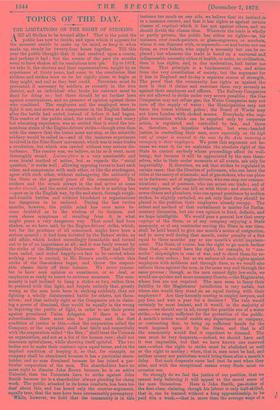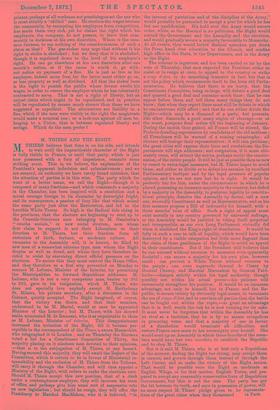TOPICS OF THE DAY.
THE LIMITATIONS ON THE RIGHT OF STRIKING.
ARE all Strikes to be treated alike? That is the point the public has now to decide, and upon which it appears for the moment unable to make up its mind, or keep it, when made up, steady for twenty-four hours together. Till this year the public thought that it had resolved upon a course, and perhaps it had ; but the events of the past six months seem to have shaken all its resolutions into 'pie.' Up to 1872, we take it, the electors and their representatives, taught by an experience of thirty years, had come to the conclusion that strikers and strikes were to be let rigidly alone, to begin as they might, and end as they best could. Terrorism must be prevented, if necessary by soldiers, as recently in the iron district, and an individual who broke his contract must be fined for doing so ; but there should be no further laws against combinations, and no pressure of opinion against those who combined. The employers and the employed were to fight it out, and arrive at a compromise in the English fashion after the battle had ended, instead of before it had begun. This resolve of the public mind, the result of long and weary but educating experience, was so settled that it stood the tre- mendous strain of the Engine-drivers' strike—though even then with the reserve that the trains must not stop, or the scientific soldiery would be called in—and of the immense experiment involved in the Nine Hours' movement, which was in some trades a revolution, but which was carried without very serious dis- turbance. The resolve was, we believe, as far as it went, most thoroughly sound. Laissez-faire is a very unscientific and even brutal method of action, but as regards the "social question," it works well ; allowing opposing forces to hurt each other, and compromise with each other, or like the stockingers, agree with each other, without endangering the authority of the State or the general peace of the community. The strikers and the struck always in the end arrive at some modus vivendi, and the social revolution—for it is nothing less —goes on in the English way, by fits and starts, through rough- and-tumble battles, and without bloodshed or organisations too dangerous to be endured. During the last twelve months, however, the public mind has once more be- come doubtful as to the wisdom of its decision, and even shows symptoms of recoiling from it, in what might prove a very dangerous way. That mind had been shaken, as we have said, by the Engine-drivers' strike, which, but for the prudence of all concerned, might have been a serious quarrel ; it had been irritated by the Bakers' strike, an odd affair, which looked exceedingly formidable and turned out to be of no importance at all ; and it was fairly overset by the strike of the Metropolitan Policemen. That had hardly been ended, and ended happily—a fact to be carried where nothing ever is carried, to Mr. Bruce's credit,—when this strike of the Gas-stokers began, and threw the respect- able classes fairly off their balance. We never remem- ber to have seen opinion so unanimous, or so deaf, or employers so ready to resort to extreme measures. The com- munity is half inclined to hang a stoker or two, rather than be pestered with dim light, and forgets entirely that, grossly wrong as the men have been in striking suddenly, they are fighting a wholly disinterested battle for others, not them- selves ; and that entirely right as the Companies are in claim- ing a power of dismissal, they would be equally in the wrong in depriving the public of light, in order to use their power against prominent Union delegates. If there is to be subordination there must also be justice, and the first condition of justice is this,—that the corporation called the Company, or the capitalist, shall deal fairly and respectfully with the corporation called "the Men ;" shall treat the Union as an organisation, and not as a foe of the human race ; shall not denounce spitefulness, while showing itself spiteful. The two bodies are to make their contract upon equal terms, and on the implied condition of keeping it, so that, for example, no company shall be abandoned because it has a particular share- holder, and no man dismissed because he has joined a par- ticular corporation of the men. The shareholders have no more right to dismiss John Brown because he is an active Unionist, than the Unionists have to strike against John Smith because he is a shareholder always pleading for cheap work. The public, attacked in its home comforts, has been too deaf about this, and has heard only the counter-argument, equally true, that the men have been unreasonably peremptory. While, however, we hold that the community is in this instance too much on one side, we believe that its instinct la- in a measure correct, and that it has rights as against certain classes of employes which it has not against others, and we should divide the classes thus. Wherever the trade is wholly or partly private, the public has either no rights--as, for instance, over coach-painters, or glass-engravers, or acrobats,. whom it can dispense with, or supersede—or had better not use them, as over bakers, who supply a necessity but can be re- placed ; but wherever the trade is based on a universal and indispensable necessity either of health, or order, or civilisation,. then it has rights, and, in due moderation, had better use them. That principle is a fundamental one, and arises from the very constitution of society, but the argument for- it has in England and to-day a separate source of strength._ The proof that the community has rights as against the men is that it claims and exercises them very severely as against their employers and officers. The Railway Companies are not allowed to strike under very severe penalties ; the Gas. Companies may not refuse gas; the Water Companies may not turn off the supply of water ; the Municipalities may not leave the towns without police ; the Board of Works may not leave London with choked sewers. Everybody who sup- plies necessities which can be supplied only by corporate action, is regulated and controlled by law, and there is, therefore, no injustice whatever, but even-handed justice, in controlling their men, more especially as the high- rate of wages is secured to the men by the Acts ensuring a monopoly to their employers. We press this argument not be- cause we want it, for we maintain the absolute right of the State to control anybody whose proceedings affect its well- being; but because it will be appreciated by the men them- selves, who in their cooler moments at all events, ask only for impartiality. If, therefore, we ask that strikes be regulated in certain cases; that the liberties of policemen, who can leave the cities at the mercy of criminals; and of gas stokers, who can placer us in darkness; and of engine-drivers, who can stop our commu- nications ; and of postmen, who can arrest our trade ; and of water engineers, who can kill us with thirst ; and above all, of" sewer-fitters and plumbers, who can spread pestilence by sudden strikes, be slightly curtailed, we ask only that they should bet placed in the position their employers already occupy. The extent and method of that curtailment is matter for Parlia- mentary discussion, but our own opinion is fixed, definite, and' we hope intelligible. We would pass a general law that every employe' of the State, or of any company enjoying a State' monopoly, or of any contractor serving the State in war time, shall be held bound to give one month's notice of resignation,. and to serve well during that month, under penalty of a fine equal to three months' pay or one month's strict imprison- ment. The State, of course, has the right to go much farther than that,—it would have the right, for example, to " con- scribe " shipwrights in case of war, and to shoot them for re- fusal to obey orders ; but as we enforce all such rights against employers with mildness and through fines, so we would also- enforce them against the men, in the same way and through the same process ; though, as the men cannot fight law-suits, we would use quicker and more summary Courts,—the Magistrates, where fees are not required. The men seem to fancy their liability to• the Magistrates' jurisdiction is very unfair, but where else would they stand on an equal footing with their employers ? Are they honestly craving to employ lawyers, and pay fees, and wait a year for a decision ? The rule would certainly be most lenient, and it would, in the majority of cases,—we should say in all, except the possible one of a water strike,—be amply sufficient for the protection of the public.- A month's notice would enable any department or company, or contracting firm, to bring up sufficient hands for the- work imposed upon it by the State, and that is all the community would find it expedient to demand. The case must be very desperate,—indeed, we should have said it was impossible, but that we have known one reserved case,—when the right to strike must be abolished as well as the right to mutiny ; when, that is, men must be had, and neither money nor patriotism would bring them after a month's delay. But such desperate cases had best be met when they arise, and with the exceptional means every State must on occasion use.
So strongly do we feel the justice of our position, that we cannot help believing it will appeal to the moral sense of the men themselves. Here is John Smith, gas-stoker of the first-class, claiming, though his labour is only half-skilled, that is, can be learned without a long apprenticeship, to be paid 40s. a week—that is, more than the average wage of a _ printer, perhaps of all workmen not practisingan art the one who is most strictly a "skilled" man. He receives the wages because the community, by exempting his employers from competition, has made them very rich, yet he claims the right which his employers, the company, do not possess, to leave that com- munity in darkness at his own discretion. Where is the com- mon fairness, to say nothing of the considerateness, of such a claim as that ? The gas-stoker may urge that without it his right to strike is abolished ; but we deny that it is abolished, though it is regulated down to the level of his employer's right. He can go elsewhere at his own discretion after one month's notice, or if the cause is worth it, go with- out notice on payment of a fine. He is just as free as his employer, indeed more free, for the latter must either go on, or lose property as well as dividend. All that the stoker loses is the right to punish the public whose favour swells his wages, in order to coerce the employer whom he has voluntarily contracted to serve. That is not a right of liberty, but an unjust claim which ought to be repudiated, and in practice will be repudiated by means much sterner than those we have suggested as expedient. The alternatives are liability to a fine, which if the men were visibly in the right the magistrate would make a nominal one ; or a lock-out against all men be- longing to a Union, that is between regulated liberty and serfage. Which do the men prefer?



































 Previous page
Previous page